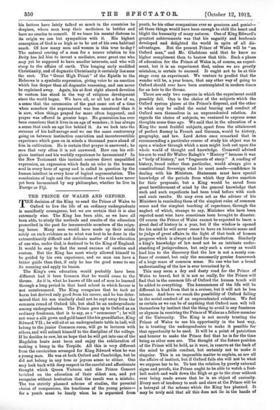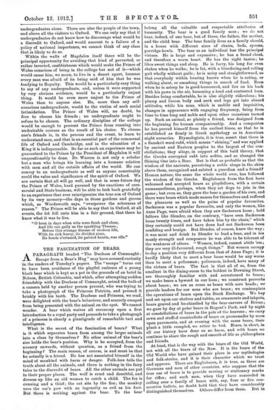THE PRINCE OF WALES AND OXFORD.
THE decision of the King to send the Prince of Wales to Oxford to live the life of an ordinary undergraduate is manifestly courageous, but we are certain that it is also extremely wise. The King has been able, as we have all been able, to study the methods and results of the education prescribed in the past for innumerable members of the reign- ing house. Many men would have made up their minds solely on such evidence as to what was best to be done in the extraordinarily difficult and delicate matter of the education of one who, under God, is destined to be the King of England. It would be easy to find the usual excuses of caution and custom. But the King has most wisely allowed himself to be guided by his own experience, and no man can have a better guide than that, if only he has the good sense to see its meaning and apply its lesson.
The King's own education would probably have been different had it been foreseen that he would come to the throne. As it is, what he knows of life and of men he learned through a long period in that hard school in which favour is not countenanced. The King recognizes that he took no harm but derived only good from his career, and he has deter- mined that his son similarly shall not be rapt away from the common round of Oxford life, but shall be an undergraduate among undergraduates. The Prince goes up to Oxford as an ordinary freshman, that is to say, as a "commoner"; he will not wear a silk gown and gold tassel like his grandfather, King Edward VII.; he will sit at an undergraduate table in hall, will belong to the junior Common room, will go to lectures with others, and will submit himself to the discipline of the college. If he decides to row, let us hope that he will get into one of the Magdalen boats next term and enjoy the exhilaration of making a bump in the Torpids. All this is very different from the curriculum arranged for King Edward when he was a young man. He was at both Oxford and Cambridge, but he did not belong in any true or joyous sense to either. One may look back with deep respect to the careful and affectionate thought which Queen Victoria and the Prince Consort lavished on the education of their eldest son, and yet recognize without hesitation that the result was a mistake. The too strictly planned scheme of studies, the parental choice of companions, the loneliness of the young prince— for a youth must be lonely when he is separated from youth, be his other companions ever so gracious and genial— all these things would have been enough to chill the heart and blight the humanity of many natures. One of King Edward's greatest achievements was that his sagacity and bonhomie developed and delighted the world in spite of all dis- advantages. But the present Prince of Wales will be " an Oxford man," and Mr. Gladstone said that he knew no higher compliment than to bestow that title. Such a phase of education for the Prince of Wales is, of course, an experi- ment, but it is an experiment that unless we are greatly mistaken, is certain to succeed. It ought not to be at this stage even an experiment. We venture to predict that the wonder will be, a year hence, that any other way of going to Oxford should ever have been contemplated in modern times for an heir to the throne.
There are only two respects in which the experiment could possibly fail. One is the choice of the subjects which the Oxford system places at the Prince's disposal, and the other is what may be called the social bearing and conduct of Oxford men themselves in an unprecedented relation. As regards the choice of subjects, we ventured to express some thoughts some time ago. We said that in the education of a King the most fruitful subjects, apart from the attainment of perfect fluency in French and German, would be history, geography, and law. Lord Acton once remarked that in recommending a particular course of study his object was to open a window through which a man might look out upon the whole world of thought and knowledge. Cromwell advised his son to read Sir Walter Ralegh's " History " because it was a " body of history," not " fragments of story." A reading of history, broad rather than particular, would always give a constitutional Sovereign what he most needs—confidence in dealing with his Ministers. Statesmen must have special knowledge of the periods from which they derive sanction for their proposals, but a King would be saved from great bewilderment of mind by the general knowledge that such and such expedients had been tried before with such and such results. He may even act as the adviser of his Ministers in reminding them of the simplest rules of common sense and the simplest teaching of experience, through the neglect of which, strange to say, Ministers who have been reputed most wise have sometimes been brought to disaster. Of course the Prince of Wales cannot be expected to learn a great deal of history in a year, but if the window is opened for his mind he will never cease to have an historic sense and to judge of great affairs in the light of that book of human progress which is always at hand for consultation. Similarly a king's knowledge of law need not be an intricate under- standing of jurisprudence, but only such a survey as would lead him to the discovery that the law is not a musty con- fuser of counsel, but only the necessarily precise framework of a huge mass of common sense. No one who has a broad understanding of the law is ever terrorized by it.
This may seem a dry and dusty road for the Prince of Wales to travel, but it is not so really, for the Prince will find that in the common life of Oxford the human tcuch will be added to everything. The humaneness of the life will be different in kind from that in a cruiser, but it will not be less intense. And here we reach the possibility of Oxford failing in the social conduct of an unprecedented relation. We feel as certain as we can be of anything that Oxford men will tell themselves by instinct that the thing to avoid is any fussiness or shyness in receiving the Prince of Wales as a fellow-member of the University. The King is not merely trusting the Prince of Wales to use his opportunity in the best way, he is trusting the undergraduates to make it possible for that opportunity to be used. It will be a point of patriotism and honour to make the Prince feel that be is for the time being as other men are. The thought of the future position of the Prince will be held, as it were, in reserve at the back of the mind to guide conduct, but certainly not to make it singular. This is an impossible matter to explain, as are all the affairs of instinct, but if Oxford fails she will not be what we suppose her to be. To test the relation by purely external signs and proofs, the Prince ought to be able to watch a foot- ball match and walk down the High or go to the river without ever being made aware that he is an object of curiosity. Every sort of tendency to mob and stare at the Prince will be a betrayal of the scheme which the King has planned. It may be truly said that all this does not lie in the hands of
undergraduates alone. There are also the people of the town, and above all the visitors to Oxford. We can only say that if undergraduates do not know how to discourage what would be a discredit to Oxford, and would amount to a failure of a policy of national importance, we cannot think of any class that is likely to do so.
Within the walla of Magdalen itself there will be the principal opportunity for avoiding that kind of perverted, or rather inverted, snobbishness which would make the Prince of Wales conscious of being in the college but not of it—which would cause him, we mean, to live in a desert apart, because every man was afraid of its being said of him that he was toadying to Royalty. This would be a particularly easy thing to say of any undergraduate, and, unless it were supported by very obvious evidence, would be a particularly unjust thing. It would be even more unjust to the Prince of Wales than to anyone else. He, more than any self- conscious undergraduate, would be the victim of such social intimidation. The Prince of Wales will, no doubt, be free to choose his friends ; no undergraduate ought to refuse to be chosen. The ordinary discipline of the college would be enough to prevent the Prince from running into undesirable courses as the result of his choice. To choose one's friends is, in the process and the event, to learn to understand men, and that is an essential part of the communal life of Oxford and Cambridge, and in the education of a King it is indispensable. So far as such an experience may be guaranteed to the Prince by the President of Magdalen it will unquestionably be done. Dr. Warren is not only a scholar but a man who brings his learning into a humane relation with men and all the outside affairs of the world. He can convey to an undergraduate as well as anyone conceivably could the value and significance of the spirit of Oxford. We are certain that all will go well, and that in some future day the Prince of Wales, hard pursued by the exactions of cere- monial and State business, will be able to look back gratefully to an experience that ever reinvigorates the true son of Oxford by its very memory—the days in those gardens and groves which, as Wordsworth says, "overpower the soberness of reason." The Prince will be able to say that in Oxford, at all events, the lot fell unto him in a fair ground, that there he knew what it was to live.
"0 born in days when wits were fresh and clear, And life ran gaily as the sparkling Thames ;
Before this strange disease of modern life, With its sick hurry, its divided aims,
Its heads o'ertaxed, its palsied hearts, was rife."











































 Previous page
Previous page